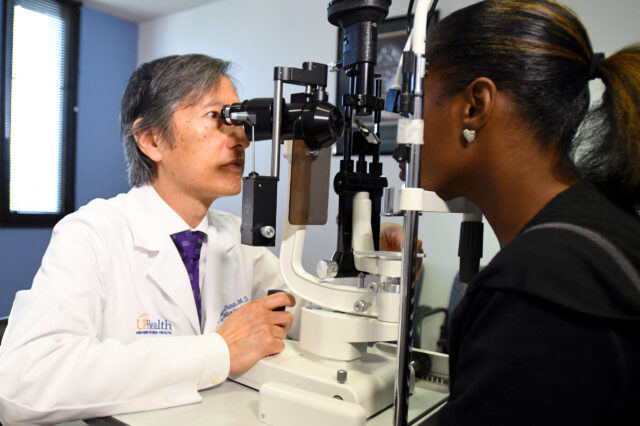Uveitis is inflammation inside your eye. Inflammation usually happens when your immune system is fighting an infection. Sometimes uveitis means your immune system is fighting an eye infection — but it can also happen when your immune system attacks healthy tissue in your eyes. Uveitis can cause problems like pain, redness, and vision loss.
Evaluation and diagnosis of uveitis
A complete medical history and eye examination will be conducted to determine what type of uveitis you have and if there is any evidence of an underlying condition. This may involve a variety of tests, such as blood work, X-rays of your back, scans, etc.
The eyes will be thoroughly examined. This usually involves the placement of eye drops to make the pupils wider so that the doctor can see into your eye more easily. You may also have a fluorescein angiogram. A small amount of yellow dye will be injected into your arm while photos are taken of your eyes. Because the drops used affect your eyesight for a short period of time, you will not be able to drive or read for a couple of hours after your appointment
Treatment options for uveitis
Prompt treatment is necessary to minimize any loss of vision. Eye drops, especially steroids and pupil dilators, are medications used to reduce inflammation and pain. For deeper inflammation, oral medication or injections may be necessary. Complications such as glaucoma, cataracts or new blood vessel formation (neovascularization) also may need treatment in the course of the disease. If complications are advanced, conventional or laser surgery may be necessary.
Uveitis in the front and middle part of the eye usually can be controlled by the frequent use of drops. Uveitis in the back part of the eye often is more difficult to treat.
What to expect
The part of your eye affected by uveitis will determine the duration of the condition. With proper treatment, anterior uveitis can clear up in a matter of days to weeks. Posterior uveitis, on the other hand, may last several months or years and could permanently alter your vision.
If your uveitis responds poorly to corticosteroids or becomes severe enough to threaten your vision, you may need a different kind of medication, such as an immunosuppressive or cytotoxic agent. Vitrectomy—surgery to remove the jelly-like material in your eye (vitreous)—may sometimes be necessary for diagnosis and treatment of uveitis.
Uveitis can recur, so it's important to see your doctor if your symptoms reappear after successful treatment.
Frequently asked questions
How did I get uveitis?
It is unknown why most people get uveitis. There is an association with some infections (such as toxoplasmosis) and certain diseases (sarcoidosis and Behcet's disease) in some patients. Some patients have an increased likelihood due to the genes they carry (HLA B27 and HLA A29). But in many patients, a cause cannot be identified. Uveitis is classified as an autoimmune disease, meaning the body reacts against itself. The trigger for this is unknown, but it might be an infection in susceptible individuals. Treating for infection is unlikely to help, though, as the immune system is already activated and causes the damage.
What types of uveitis are there?
Uveitis is divided initially into anterior, in which only the front part of the eye is involved (this is also sometimes called iritis and iridocylitis), posterior, in which the back of the eye is involved, and panuveitis, in which the front and the back of the eye are both involved. Within each type, there are several subtypes. Anterior uveitis can be subdivided into acute disease, which lasts a few weeks, and chronic disease, which is defined as lasting more than three months. Posterior uveitis is usually chronic and can last a long time except in patients with toxoplasmosis, when it may settle in a few weeks. It is important to know which type of uveitis you have as this determines the type of investigations and treatment you need, as well as complications associated with the condition.
Can uveitis be cured?
No. Treatment only suppresses the harmful inflammation until the disease process is stopped by your body's own healing process. The treatment needs to be continued as long as the inflammation is active. In any patient, it is not possible to know how long the disease will last.
Will I go blind?
Most patients treated for acute uveitis do not lose their vision. The main causes of visual loss in patients with chronic uveitis are cataracts, glaucoma or damage to the back of the eye from pressure inside the eye and macular edema of the retina. The two most important factors in preventing permanent loss of vision are to control the inflammation and ensure that the intraocular pressure is not elevated.

